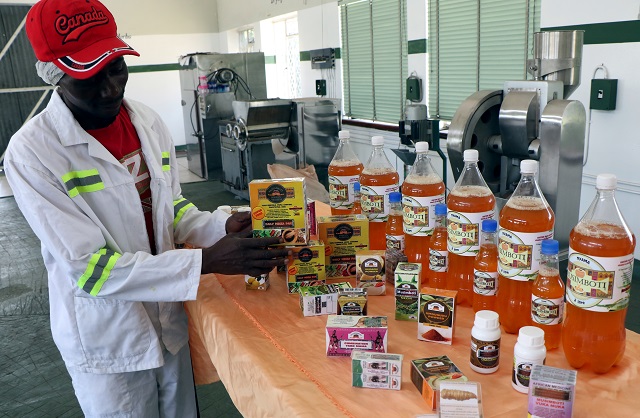
The Sunday News

Dumisani Nsingo, Senior Business Reporter
ONE of the country’s leading herbal medicines manufacturer, Musimboti Traditional Science and Technology Institute is seeking to fill the void in the supply of affordable drug alternatives following the general price increases of medical drugs.
Company managing director Mr Morgan Zimunya said the institute was working at enhancing its production capacity to meet the demand of its products on the local and regional market.
The company is part of Musimboti African Traditional Association that produces pills, cough mixture, eye drops, tea leaves, ointments and other medications which help the body to keep fit under the Musimboti brand.
It is registered under the Traditional Medical Practitioners’ Council while its products are licensed for commercial distribution under the newly gazetted Medicines and Allied Substance Control Regulations, Statutory Instrument 97:2015. The organisation is allowed to manufacture its products as complementary medicines so that they can be sold and distributed commercially.
“We are looking forward to resuming supplies in the country and region. We had not been commercial for sometime but we are now doing so through Standard Association of Zimbabwe which has now set standards as well as guidelines for the commercialisation of African traditional medicines.
“We are in the process of building our capacity but our medicine is now available at selected supermarkets in Bulawayo and very soon we will be supplying our products at chain stores throughout the country so that its users can easily access it, including those seeking to use it for the first time,” said Mr Zimunya.
In 2004, the Medicines Control Authority of Zimbabwe (MCAZ) removed Musimboti herbal drink from the market because it was sold as a medicine yet it was manufactured from unlicensed premises.
Mr Zimunya said use of herbal medicines has been on the rise over the years.
“As Musimboti we say African traditional medicines are the mother of all medicines and are user friendly. It is readily available since it is natural and it doesn’t cost much with the price being negotiated in line with our African culture and virtues.
“It is also exciting to note that according to a World Health Organisation survey traditional medicine use rose to about 90 percent, which means we are attracting customers from all religious sects,” said Mr Zimunya.
Traditional medicines have been used by humankind for the treatment of various diseases since long before the advent of orthodox medicine, and to this day, serve the health care needs of the majority of the population living in the WHO African Region.
He said the institute considered packaging its herbal medical properties as capsules, powder and as bottled syrup and liquid to enable it to be easily administered and handled.
“Our overseas clients cited difficulties in handling herbal medicines in the raw form which is mostly barks, roots and powder thus we introduced capsules and bottled the medicine and we are even boxing the medicines to make them more attractive. We have a number of clients in the United Kingdom, Canada, Australia and South Africa,” said Mr Zimunya.
He said the organisation added new products to its medicinal line for curing of various ailments.
“We have a new product, Mazondo Spice which can be sprinkled on food just like ginger and garlic. This spice increases nutrients and food value. We have also introduced Musimboti Cancer Powder which heals wounds of cancerous nature,” said Mr Zimunya.
He said the institution obtains most of its herbs from its plantations in Bulawayo and Vumba.
“We have a farm in Bulawayo and Vumba where we grow medicinal trees and harvest. We get about 80 percent of the herbs from these farms while we also buy some from individuals.
“We however, advise members of the public to access traditional medicine from registered practitioners. We also have a registration office to register those dealing in herbs,” said Mr Zimunya.
Traditional Medical Practitioners Council (TMPC) registrar Mrs Joyce Guhwa expressed dissatisfaction at the low number of traditional medical practitioners registering to practice legally.
Traditional medical practitioners have to register in line with the Traditional Practitioners Act which seeks to ensure that operations of healers are above board.
“This year we are not satisfied with the slow pace at which traditional healers are registering. It seems they are not forthcoming.
“We are trying to look into the issue of what is causing them not to register because at first most of them cited financial challenges. It costs $25 for new registration and 15 for renewal,” said Mrs Guhwa.



